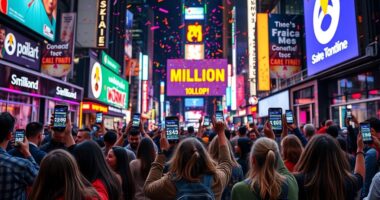Digital literacy is now a crucial human right because it allows you to access information, communicate effectively, and participate fully in today’s connected world. With strong digital skills, you can protect your privacy, identify scams, and stay safe online. It also helps close the digital divide, ensuring everyone has equal opportunities in society. Understanding why digital literacy matters empowers you to navigate digital spaces confidently—keep exploring to discover how it shapes your everyday life.
Key Takeaways
- Digital literacy enables equal access to information, education, and employment opportunities, making it essential for societal participation.
- It protects individuals from online risks like scams, misinformation, and identity theft, safeguarding personal security.
- As digital services become integral to daily life, digital literacy is necessary for full engagement and inclusion in the digital economy.
- Bridging the digital divide through digital literacy promotes social equity and prevents exclusion from technological advancements.
- Recognizing digital literacy as a human right affirms everyone’s need for skills to participate responsibly and securely in a connected world.

Have you ever considered how essential digital literacy has become in our daily lives? In today’s connected world, understanding how to navigate the digital landscape isn’t just a skill—it’s a necessity. Digital access is the foundation that allows you to communicate, learn, work, and participate fully in society. Without it, you risk being excluded from opportunities that are increasingly available online. The importance of digital literacy goes beyond knowing how to use apps or browse the internet; it’s about developing the competence to evaluate information critically, protect your privacy, and engage responsibly in digital spaces.
Online safety is a crucial aspect of digital literacy that you can’t afford to overlook. As you move through different platforms, you encounter a multitude of risks, from identity theft to misinformation and cyberbullying. Being digitally literate means knowing how to safeguard your personal information, recognize suspicious activity, and avoid scams. It’s about understanding the importance of strong passwords, secure connections, and being cautious about the data you share. If you lack these skills, you’re more vulnerable to attacks, which can have serious personal and financial consequences. Promoting online safety through digital literacy empowers you to take control of your digital identity and protect yourself in an increasingly complex online environment.
Additionally, fostering digital literacy contributes to reducing the digital divide and ensuring equitable access to technology and information for all individuals.
Frequently Asked Questions
How Does Digital Literacy Impact Employment Opportunities?
Digital literacy directly impacts your employment opportunities by enhancing your digital skills, which are increasingly essential in today’s job market. When you develop strong digital skills, you improve your chances of landing better job prospects, as employers seek candidates who can efficiently navigate technology. Without these skills, you might face limited options or struggle to stay competitive. Embracing digital literacy opens doors to more diverse and higher-paying jobs, boosting your career growth.
What Measures Are Governments Taking to Promote Digital Literacy?
While some see technological access as a privilege, governments recognize digital equity as essential. They’re launching initiatives to improve digital literacy, such as providing free internet, affordable devices, and training programs. These measures aim to bridge gaps, ensuring everyone can develop digital skills. By prioritizing digital equity, governments work toward a future where technological access isn’t limited by socioeconomic status, empowering you to participate fully in today’s digital world.
How Does Digital Literacy Influence Social Inclusion?
You see that digital literacy helps bridge the digital divide by giving you the skills to access and navigate online platforms. When you’re digitally literate, you can participate in online activism, amplifying your voice and advocating for social change. This inclusion fosters a sense of belonging and empowerment, ensuring you’re not left behind in a digital world. Ultimately, digital literacy promotes social equality by connecting you to essential information and communities.
What Are the Main Barriers to Achieving Digital Literacy for All?
You face barriers like limited access to technology, which prevents you from developing digital skills. Digital skill gaps exist because of uneven education and resources, making it harder for many to become digitally literate. Socioeconomic factors, infrastructure issues, and lack of affordable devices also block your path to digital inclusion. Overcoming these barriers requires investment, equitable access, and targeted training to guarantee everyone can participate fully in the digital world.
How Can Individuals Improve Their Digital Literacy Skills?
Imagine wielding a digital sword, ready to conquer the online domain. To sharpen your skills, explore digital skill development courses and tutorials. Stay vigilant by boosting your online safety awareness—think of it as armor against cyber threats. Practice regularly, explore new tools, and stay curious. By actively engaging and educating yourself, you turn into a savvy digital warrior, confidently steering through the internet’s vast landscape.
Conclusion
Imagine a world where everyone has equal access to digital literacy. It’s not just about skills; it’s about empowering you to participate fully in society, access opportunities, and protect your privacy. Many believe digital literacy is the new human right because it unleashes chances for growth and connection. If we treat it as a fundamental right, we create a future where everyone can thrive in the digital age—because knowledge truly is power.










